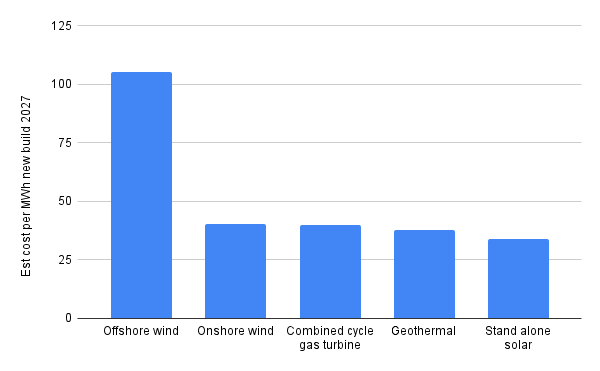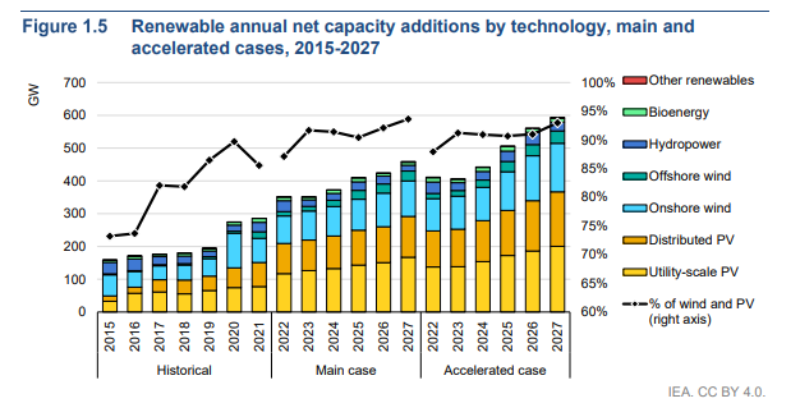
Green hydrogen - why should I care what it costs?
If you care about sustainability being financeable, you should also care about how much it costs to make green hydrogen.
Summary: I know this might seem a strange thing to say - but if you care about sustainability being financeable, you should also care about how much it costs to make green hydrogen. If you live in the US, the outlook is now encouraging, less so if you live in Europe (although that may change quickly).
Why this is important: Many people think about the green transitions as just being about stopping using fossil fuels and using green electricity instead. But that doesn't work everywhere. For many industries electrification is not enough. In heavy industry and transport we need a different solution, one that looks more like fossil fuels, but without the negative impacts. This is where green hydrogen comes in.
The big theme: Green hydrogen could potentially drive the decarbonisation of how we make steel, fertiliser and plastics, and how we power our heavy transport. According to Our World in Data industry alone accounts for nearly a quarter of our global energy related GHG emissions, it's bigger than transport and our buildings. And it's not an exaggeration to say that if we cannot decarbonise industry in a financially viable way, then our net zero targets are just vague promises in the wind.

The Detail
Green hydrogen - it really matters how much it costs
So, why does green hydrogen not get the same attention as say electric vehicles (EV’s)? That's easy. Unlike EV’s it's deeply technical and complicated - and many analysts hide behind this. But, if we don’t understand it, how can we decide if we are doing the right thing?
We have written a number of blogs on why green hydrogen is so important, including this recent quick insight on greening ammonia. For now, you don't need to know how it's made, or any of the technical stuff behind the solutions (although we will come to these in future blogs). You just need to understand one very big issue - COST.

Cost is important for industrial companies
Industries such as steel, plastics and fertilisers are brutally cost competitive. If one set of companies face higher costs than their peers, then they rapidly become uncompetitive. So, if we want industry to scale up its use of green hydrogen it either has to be cheap enough or we need new regulation. And regulation is tough for a product that can be made anywhere in the world.
The chemistry is understood
The good news is that the chemistry behind using hydrogen in industry is already well understood. We know how to make steel, and ammonia for fertiliser, using it. And we know how to use it to make plastics. But, in the absence of regulation, it comes down to cost.
So, how much does green hydrogen cost now and what can be done to get the cost down. Most hydrogen in the world (nearly all) is currently made using fossil fuels (often called grey hydrogen). This costs between $1 and $2/kg to produce, depending on where in the world you are located. By contrast, the cheapest green hydrogen (made using electricity and water) costs close to $3/kg, and in most parts of the world it's more like $4-6/kg. And in Europe, its closer to $10/kg.
That is way too big a price gap to expect industry to switch to using green hydrogen.
So, what needs to change to make it price competitive with fossil fuel hydrogen?
One solution is subsidies. Here the recent US Inflation Reduction Act (IRA) is a big deal. As part of this, a clean hydrogen credit, called 45V, will provide up to $3 per kilogram in tax credits after adjusting for lifecycle greenhouse gas (GHG) emissions and producers’ compliance with prevailing wage and apprenticeship requirements.
Let's back up a second - at a subsidy of at least $3/kg, which could mean that green hydrogen could cost as little as $50c/kg by 2030, compared with fossil fuel hydrogen at around $1/kg. Obviously, this is for the US only, but it's hard to see other countries and regions not following this - the alternative is to watch their own industry become less competitive.
But remember, these subsidies end in roughly 10 years, at least that is the current plan. After that the price will be driven more by the underlying fundamentals, and less by the subsidies and tax breaks - unless of course they get extended.
So, the other big driver of green hydrogen cost is the price and availability of the green electricity. This is a big topic in its own right, but the short and simple metric here is how much the green electricity costs.
A recent report from the US Department of Energy reiterated the target price of <$20/MWh, which would allow the unsubsidised cost of green hydrogen to fall from $3–6/kg today to $1.50–2/kg by 2035. This would allow declines in the cost of production to take over the load from IRA related subsidies.
Is this likely - well probably yes. The current renewable electricity prices (again US data - this time from a 2022 US Energy Information Administration report) are mostly around $35/MWh. So we need them to drop by nearly half over the next 10-12 years. In the context of historical cost reductions, especially in solar, this is in line.

Recent work by the US Solar Energy Technologies Office suggests that the $20/MWh level is achievable around 2030, although this excludes any necessary storage and grid related costs. So, the tax credits in the IRA for solar will also play a part.

Other considerations - do we have enough green electricity?
One final point to note, by 2030, up to 200 GW of additional renewables would be needed in the US alone to power clean hydrogen electrolysis, although this value could be decreased if nuclear-powered electrolysis becomes more widely available. This compares with the current solar installed capacity of over 100 GW, and slightly more from onshore wind. So a roughly doubling of what the US has now. Remember, this is on top of the new supply needed to decarbonise current electricity production.

This is all the topic for another blog, as we are running the risk of going off topic.
Something a little more bespoke?
Get in touch if there is a particular topic you would like us to write on. Just for you.
Contact us
Please read: important legal stuff.


